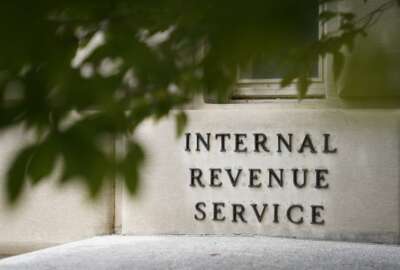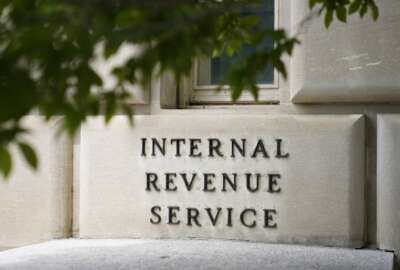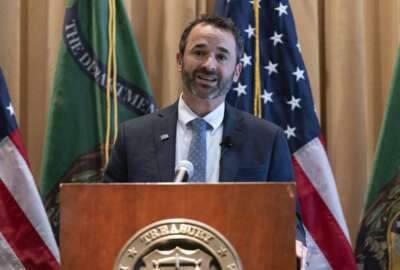IRS puts modernization funds into cutting paper workload, beefing up enforcement
The IRS is dipping into nearly $60 billion of modernization funds to stay ahead of its paper workload.
The IRS, besieged by a massive volume of paper tax returns and unopened mail at the height of the COVID-19 pandemic, is dipping into nearly $60 billion in modernization funds to stay ahead of its paper workload.
IRS Commissioner Danny Werfel told reporters on Thursday that the agency is using money in the Inflation Reduction Act to replace more than 200 outdated scanners, which will help the agency quickly process incoming tax returns and correspondence.
Werfel said the IRS plans to purchase 700 modern scanners in total, and that these investments will “drive IRS efforts to provide world-class customer service.”
“The bottom line is an IRS after the Inflation Reduction Act is very different than the one before, which is good for taxpayers and good for the nation,” Werfel said.
To address a major backlog in paper tax returns, the IRS in recent years relied on overtime and pulled IRS employees off their regular jobs and into “surge teams” to process mail and paper tax forms.
Werfel said the IRS made significant progress this year scanning and digitizing paper tax returns.
During this year’s filing season, the IRS scanned about 480,000 total forms and about 10,000 individual tax returns. Once the filing season ended, the agency scanned an additional 35,000 individual tax returns, as well as other documents.
The IRS is also looking to replace at least six high-volume mail sorting machines at its processing centers across the country.
Collecting delinquent taxes from millionaires
The IRS is also building up its capacity to shrink a growing tax gap between what taxpayers owe and what the agency is able to collect.
The IRS, in the last few months, closed 175 cases involving tax-delinquent millionaires, and brought in $38 million. Werfel said “this is just the start” of the revenue the IRS expects to bring in as it targets high-income tax cheats.
“It just shows you how much money is out there in delinquent taxes, because there are so many more cases for us to tackle, and so there’s just a significant opportunity there,” Werfel said. “If we’re not funded in our enforcement efforts effectively, then we’re leaving a lot of that money on the table.”
Werfel said the IRS will be able to ramp up its enforcement efforts as it increases hiring.
“We are making progress against all of our hiring goals,” Werfel said, but said that high-income taxpayers continue to outnumber the size of the IRS workforce that’s specifically trained to examine those returns.
The IRS made about 10,000 new hires so far in fiscal 2023, but Werfel said those hires are spread across the entire agency, and that many of those hires went toward staffing up its customer service operations.
Werfel added that it can take longer for the IRS to hire specialized enforcement personnel, given the amount of training and education that’s required for those positions.
“This is something that is going to continue to be a focus in the coming months, and over the next few years,” Werfel said. “We will not be able to grow the workforce overnight, but we will make steady progress in ensuring we have the right amount of exam personnel to deal with the number of high-wealth filers that we have.”
New app, better website, more in-person help
The IRS is also testing out a mobile app prototype that would let users scan a paper IRS form or notice, and pull up related information and guidance on IRS.gov.
Werfel said the app is currently undergoing user testing. He said the IRS will determine the timeframe for full deployment once it completes testing.
The IRS also plans to overhaul IRS.gov ahead of next year’s filing season. Werfel said the IRS plans to update the homepage, provide updated information on the upcoming filing season and make the site easier to navigate.
By mid-August, IRS will allow taxpayers to reply online to an additional 53 kinds of letters and notices, rather than mailing a response through the mail. That’s on top of 10 commonly used forms the IRS digitized this year.
The IRS is also looking to make 18 commonly used forms mobile-friendly in time for next year’s filing season.
Werfel said that within the next five years, taxpayers will be able to securely file all documents and respond to all notices online, as well as securely access and download their data and account history. This goal, he added, will translate into a simpler tax filing process for millions of taxpayers.
As part of the IRS’s goal of “meeting taxpayers where they are,” Werfel said the agency is also scaling up its level of in-person tax help — particularly in rural areas.
The IRS is rolling out community assistance visits, in which the IRS sets up temporary Taxpayer Assistance Centers to reach out to underserved communities.
The IRS held the first of these visits last month in Paris, Texas, which is more than 90 miles from the nearest IRS office. Werfel said the IRS so far plans to set up community assistance visits at seven additional locations nationwide.
Meanwhile, the IRS is continuing to fully staff up Taxpayer Assistance Centers across the country that, due to budget cuts, had previously been understaffed or closed.
Werfel told reporters that the IRS will continue to make progress on its modernization goals, but warned efforts by congressional Republicans put those plans in jeopardy.
“I know that as we enter upcoming budget negotiations, there’s an interest in scaling back IRS resources. I hope that we can make the case to Congress and the American people that we are putting our resources to work for them,” Werfel said.
Laurel Blatchford, the Treasury Department’s chief implementation officer for the Inflation Reduction Act, urged Congress to keep providing the IRS stable annual budgets to fund routine operations, including answering calls from taxpayers.
“The IRS needs to constantly balance the day-to-day of running the nation’s tax system with instituting longer-term improvements to service and technology that are going to pay dividends for taxpayers decades down the road,” Blatchford said. “This is why ensuring a sufficient annual budget for the IRS is so important in achieving long-term goals.”
Copyright © 2024 Federal News Network. All rights reserved. This website is not intended for users located within the European Economic Area.
Jory Heckman is a reporter at Federal News Network covering U.S. Postal Service, IRS, big data and technology issues.
Follow @jheckmanWFED






